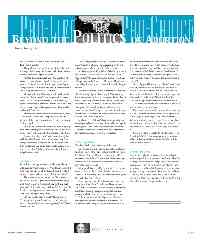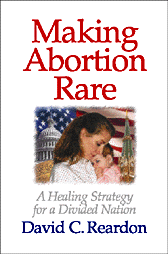Beyond the Politics of Abortion
David C. Reardon, Ph.D.
Everyone has an opinion about abortion. That’s fine–up to a point.
The problem is when these political and moral views get in the way of efforts to help those who are hurting because of a past abortion.
Just for the moment, set aside the question of whether or not abortion should be legal, and ask yourself, “Shouldn’t we all offer understanding and compassion to our friends and family members who are feeling grief over a past abortion?”
Most people would answer yes. Indeed, this is one of the few areas of common ground between both sides of the abortion debate. Unfortunately, people on each side generally believe that while they are understanding and compassionate, those on the “other side” are not.
The truth is closer to this: both sides really want to be understanding and compassionate, and both sides are blind to the ways in which they are failing in this regard.
As a result, women and men who are struggling with unresolved grief over an abortion are caught in a trap. They’re boxed in by the politics of abortion.
On one side, they are afraid to share their grief with friends who are “pro-life” because they fear being condemned and rejected. On the other side, they’ve learned that when they turn to friends who are “pro-choice,” their grief may not be acknowledged as truly valid.
Pro-Choice Denial
In the latter case, pro-choice friends typically try to offer support with words like, “Just forget about it. It was your best choice at the time. It wasn’t really a baby yet. You can have another baby some day.”
These statements are meant to offer reassurance. But those grieving a past abortion hear something else: “Just forget it. You didn’t lose anything that was real.” They walk away feeling that their grief is irrational, unimportant, or even abnormal, and so they bury their pain once more.
But this buried pain is exactly their problem! They want to expose it, work through it, and get beyond it–and they need the support of their loved ones to do this.
This is why people of every culture hold funerals and wakes. It is a time of open grieving when we acknowledge and validate each other’s loss.

In abortion, something is lost. Whether you want to call it the loss of a child or just the loss of an “opportunity” to have a child, the loss is real. It has to be grieved and released. If friends and loved ones deny this grief, the grief process will actually be prolonged.
Yet pro-choice advocates often hesitate to recognize the reality of post-abortion grief because they fear this means they have to recognize the death of a baby, which may somehow undermine the political argument for legal abortion. Some extremists will even go so far as to deny that abortion can ever cause emotional suffering, a claim that is insulting to the millions of women and men who know differently from their own experience.
In short, the politics of abortion are getting in the way of post-abortion healing. Those who are experiencing grief do not need rationalizations or slogans. They need the reality of their emotional experience to be understood, accepted, and respected.
Pro-Life Judgmentalism
Now let’s look at the other side of the trap.
Do women and men struggling with a past abortion feel comfortable talking about it with their pro-life friends? Rarely. This is because the pro-life movement has done a far better job of condemning abortion than of promoting compassion for those who have experienced it.
Most pro-lifers probably do want to be compassionate. They really do “hate the sin, but love the sinner.” Unfortunately, this seldom comes through in their anti-abortion rhetoric.
Consider, for example, this comment made by many pro-lifers: “I can’t understand how anyone could have an abortion.” Sadly, anyone who says this is merely exposing his ignorance of the immense pressures which drive people to choose abortion.
Polls show that at least 70 percent of women having abortions believe abortion is immoral. Most of these women thought they would never have an abortion. Many even considered themselves to be pro-lifers. But when they found themselves trapped in a hard situation, they ended up submitting to the “evil necessity” of abortion as their “only choice.” With this fact in mind, a more humble pro-life attitude would be to say, “Who am I to throw stones at others?”
Secondly, pro-lifers who say “I don’t understand how anyone could have an abortion” are blind to how hurtful this statement can be. Think about it. What is the implication of this comment to a person who has had an abortion? Won’t it be heard as, “Only an evil person could ever have an abortion?”
This is not what most pro-lifers intend to say, but it is the message that is heard.
Faced with comments like these, it is no wonder that most women and men hurting over a past abortion will go to great lengths to hide their secret. Would you share your secret grief over a past abortion with someone who “just can’t understand” how anyone like you could do such a thing? Of course not.
Most pro-lifers probably don’t intend to be condemning. Indeed, most would genuinely want to offer comfort and understanding. But the truth is, most don’t know how.
Let’s Face Their Reality
Bottom line: whether you consider yourself pro-choice or pro-life, it is essential to acknowledge the feelings of those who do feel pain after an abortion. Your political and moral views about abortion will not change how they feel. Pushing your views may simply prolong or aggravate their negative feelings.
Everyone, on both sides, can do better. Our friends and loved ones need us to do better. Reading this publication will help you do better.
David C. Reardon, Ph.D., is the director of the Elliot Institute and author of Making Abortion Rare: A Healing Strategy for a Divided Nation and The Jericho Plan: Breaking Down the Walls Which Prevent Post-Abortion Healing.

